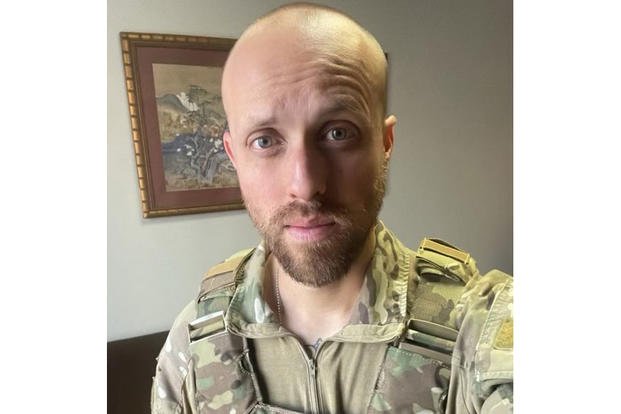The U.S. military said late Thursday that after 43 days of recovery and salvage efforts it has concluded its search for the remains of the last of eight airmen who died aboard a V-22 Osprey that crashed off the coast of Japan in November.
Remains of seven airmen who died in the Nov. 29 mishap were located and recovered during the search off the southern tip of mainland Japan, but Air Force Special Operations Command said in a statement that the body of Maj. Eric Spendlove could not be found.
"Our eighth airman, Maj. Eric 'Doc' Spendlove, was not recovered and next-of-kin notifications were made about the conclusion of operations," the command said. "The majority of the aircraft was recovered, and Air Force Special Operations Command continues the investigation into the cause of the mishap."
Spendlove, 36, was a native of St. George, Utah, and was the medical operations flight commander. He received his commission through the Health Professions Scholarship Program at the Kentucky College of Osteopathic Medicine and entered active duty on July 1, 2017, according to Air Force Special Operations Command.
"Eric exemplified the definition of a quiet professional with steadfast devotion to his family and profession," Air Force Lt. Col. Christopher Pellegrino, 1st Special Operations Squadron commander, said in a statement. "Eric was an incredible son, husband, brother and father. He motivated others with enthusiastic energy in moments of exhaustion, yet was always a calm voice of reason during times of uncertainty."
The Osprey that went down, Gundam 22, was on a training mission off Yakushima island. The deadly crash triggered a grounding of all Air Force, Marine Corps and Navy V-22s. That stand-down and an investigation into the mishap are still underway.
An initial investigation after debris was pulled from the ocean indicated a mechanical failure in the Air Force special operations Osprey. The initial assessment raised new questions about the safety of the aircraft amid a mysterious mechanical issue, called a hard clutch engagement, that has been seen in the V-22 for more than a decade. The clutch issue has come under more scrutiny recently following several deadly mishaps.
It is still unclear what caused the Nov. 29 crash.
Prior to the training crash in Japan, three Marines were killed in August when their MV-22 Osprey crashed during training in Australia -- the cause has yet to be publicly confirmed by the service -- and five Marines died in 2022 when their Osprey suffered a catastrophic clutch failure during training in California.
The Nov. 29 incident marked the deadliest CV-22 crash in the Air Force's history, according to Air Force Safety Center data.
Search efforts included more than 1,000 personnel, 46 aircraft, 23 maritime vessels, and 21 unmanned air and watercraft looking for wreckage and remains, covering more than 60,000 square kilometers of the ocean surface and 39 square kilometers of the ocean floor, according to the Air Force.
Last week, the service said the voice and data recorder -- called the "black box" -- from the Osprey had been located, a major find as it investigates the incident.
Lt. Col. Rebecca Heyse, a spokeswoman for Air Force Special Operations Command, told Military.com last week that the black box "will be transported to laboratories for data retrieval" and that officials "expect the analysis process to take several weeks."
"While it is with tremendous deep regret that we were unable to find our last teammate, Maj. Eric Spendlove, the combined joint efforts of our Japanese allies and U.S. military forces has been inspiring to see the lengths our forces will go in order to attempt to bring a teammate home," Rear Adm. Jeromy Williams, head of Special Operations Command Pacific, said in a statement.
Military.com reported early Thursday that the Government Accountability Office, a federal watchdog agency, will examine the circumstances behind the recent V-22 Osprey crashes and mishaps.
Related: Spate of Osprey Mishaps, Including Air Force's Most Deadly, Will Be Investigated by Federal Watchdog













